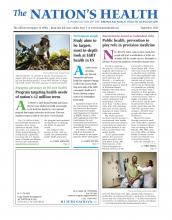As parents replace their kids’ pool passes with loose-leaf paper, it’s a sign that a new school year is approaching. Adjusting to school may be hard for kids who have spent months at play, but there are ways for parents to get their kids back on a healthy path.
Soothing back-to-school jitters
A new school year means new teachers, new classmates and new responsibilities. As a result, a child may become a bundle of nerves well before the bell rings.
“It’s very common for children and teens to be nervous or excited about starting school,” says Karen Poulos, MD, director of child and adolescent psychiatry at the University of North Carolina-Chapel Hill. “Part of these are normal anxiety. Some of these worries stem from questions such as ‘Will kids be nice to me?’ ‘Are my parents OK if I’m away from them?’ ‘Is the work going to be too hard?’”
Signs a child may be anxious about starting school include complaints of headaches and stomachaches and changes in appetite, energy levels and sleeping patterns, Poulos says. Anxious children can also be withdrawn or irritable.
Parents should keep communication open with children who feel nervous about starting school and reassure them their feelings are normal.
Getting back on track with Zzzs
A later-than-usual sleep schedule during the summer may result in a rude awakening in the fall when kids have to get up early for school. Parents whose kids had late summer nights should start preparing them for earlier wake-up times by gradually making their bedtimes earlier in the weeks leading up to school, says Leila Kheirandish-Gozal, MD, MSc, director of clinical sleep research at the University of Chicago’s Department of Pediatrics.
Preschool-age kids should get 11 to 12 hours of sleep, while school-age kids should get at least 10 hours of sleep each night, according to the National Heart, Lung and Blood Institute. Teens should aim for nine to 10 hours, the institute says.
Developing a family bedtime routine can also help younger children get back into a structured sleeping schedule, Kheirandish-Gozal says.
“Start the routine by having the children change into their pajamas, brush their teeth and then have a bedtime story with a parent or read a book,” Kheirandish-Gozal says.
For teens, she says it’s important to set guidelines for using electronic devices before bedtime, as those can make teens stay up even later.
Planning healthy lunches
Between cookouts and ice cream truck visits, kids’ diets during the summer may veer toward unhealthy. Parents getting back into the routine of packing lunches for kids should make sure to include healthy options that will fill their bellies and feed their brains in the classroom.

Photo by SolStock, courtesy of iStockphoto.
When filling the lunch bag, variety is key, says Janet de Jesus, MS, RD, a nutritionist in the Center for Translation Research and Implementation Science at NHLBI. De Jesus recommends lunches packed with whole grains, fruit and vegetables because those are sources of nutrients and vitamins such as fiber, magnesium and vitamin C. Parents should consider choosing milk as a beverage so their school-age kids get vitamin D and calcium, she says.
Consider using whole-grain bread, wraps or pita pockets to fill with vegetables, lean meats or cheese and nut butters or spreads such as hummus, de Jesus says. Other options include vegetables such as carrots, snap peas and cucumbers, or any fresh fruit that’s in season. Teens who pack their own lunches should aim to have the same mix of foods that include fruit, vegetables, dairy, protein and whole grain.
“Lunches are great opportunities to get kids to have a fruit and vegetable serving,” de Jesus says. “Whole or cut up fruits are great for lunches. Mix it up by adding a veggie dip.”
Parents should pack lunches that will keep well without a refrigerator, such as beans, fruits, salads, nut and seed butters and vegetables.
Preventing infections
Before children set foot into a classroom, parents should make sure they are up to date on vaccines that will keep them and their fellow classmates healthy.
Children should receive a flu shot every year, starting as early as the age of 6 months, according to the Centers for Disease Control and Prevention. CDC also recommends children ages 11 and 12 receive doses of the human papillomavirus, or HPV, vaccine and the meningococcal conjugate vaccine as well as a tetanus-diphtheria-acelluar pertussis, or Tdap, booster vaccine.
Parents should keep their children’s vaccination records updated prior to the start of a new school year. Check with a health care provider or health department about which vaccines are required, as it may vary depending on which state you live in.
For more child and teen health tips, visit www.cdc.gov
- Copyright The Nation’s Health, American Public Health Association









